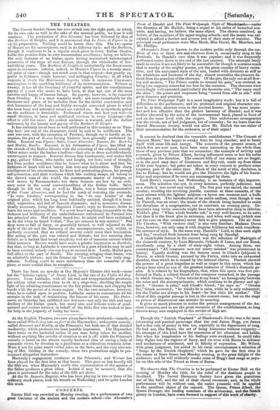CONCERTS.
Exeter Hall was crowded on Monday evening, for a performance of two great Cantatas of the ancient and the modern school—the Alexander's
Feast of Handel and The First Walpurgis Night of Mendelssohn—under the direction of Mr. Mullah; _being a sequel to his series of historical con- certs, and having, we believe, the same object. The chorus consisted, as before, of the members of his upper singing-schools; and the music was cal- culated to afford a further and severer test of their state of training. The principal vocal performers were Miss Birch, Miss Duval, Mr. Manvers, and Mr. Phillips.
Alexander's Feast is known to the modern public only through the me- dium of two or three airs and choruses from it, occasionally snug at the Festivals. In Handel's own time it was popular; and it was frequently performed entire down to the end of the last century. The attempts lately" made to revive it are not likely to be successful: for though it contains much that is worthy of the mighty master, yet the great number of heavy recita- tives, and the antiquated style of the airs, loaded with divisions as stiff as the whalebone and buckram of the day, almost neutralize the pleasure de- rived from the grandeur of the choruses. Of the airs, the only one at all flow- ing and modern, "The Prince unable to conceal his pain," was omitted, as being (we suppose) somewhat too free for the occasion. The choruses were exceedingly well executed; particularly the favourite one, "The many rend the skies"; the points and responses being "tossed from side to side with great firmness and precision.
The First Walpurgis Night is a most imaginative work; but it is full of difficulties to the performers; and its profound and original character ren- ders it, at first, abstruse even to the musical hearer. It was more imper- fect and less effective than the plainer harmony of Handel; and it was further obscured by the noise of the instrumental band, placed in front of and on the same level with the singers. This unfortunate arrangement was the result, not of bad judgment, but of necessity; for we learn that the Sacred Harmonic Society would not allow Mr. Hullah the use either of their accommodation for the orchestra, or of their organ!
























 Previous page
Previous page